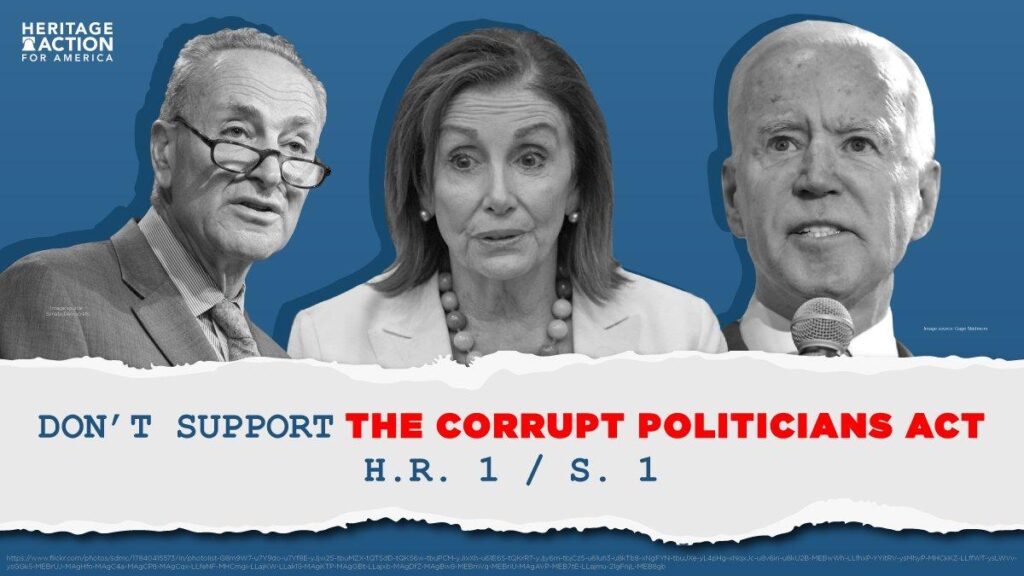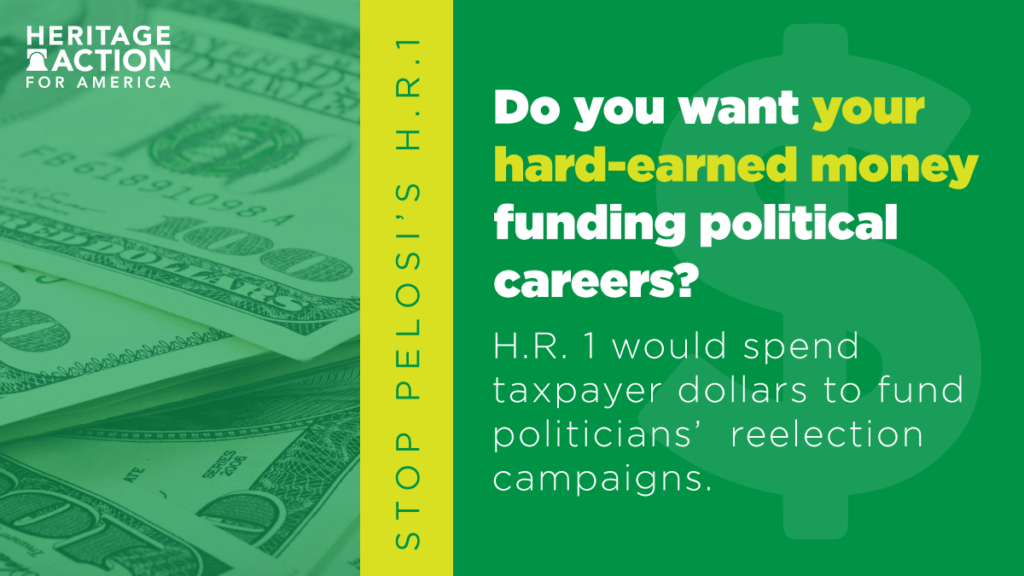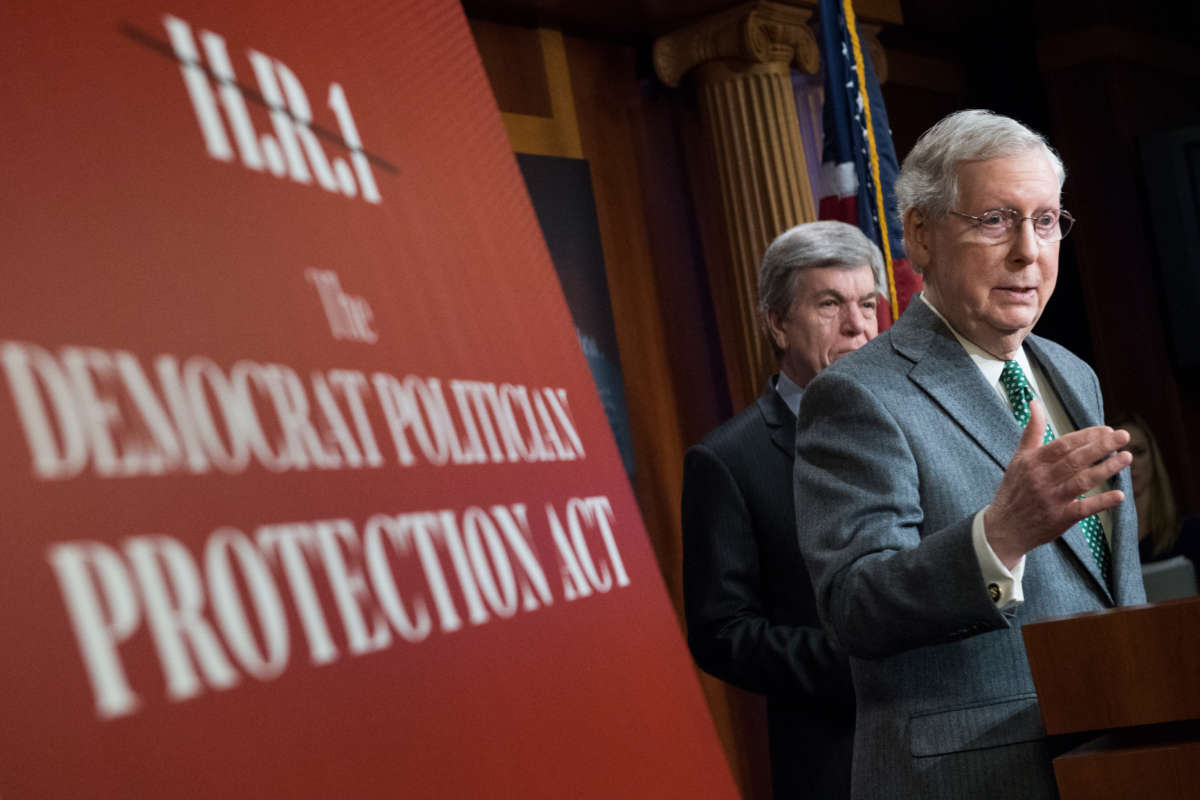The For the People Act, Democrats’ wide-ranging election and ethics reform bill, got its first hearing this week in the Senate Rules Committee. The bill, Senate Bill 1 (S. 1), addresses numerous problems with the current electoral system and includes sweeping measures to block voter suppression efforts, expand voting, disclose dark money, and limit financial conflicts of interest among elected officials.
The bill has already passed the House but will have no chance of getting through the Senate, where Democrats have the slimmest possible majority, under the current filibuster rule that imposes a de-facto 60-vote hurdle to enact most legislation. As the stakes for voting rights become clear, pressure to eliminate the filibuster has intensified, but two Democrats, Sens. Joe Manchin (WV) and Kyrsten Sinema (AZ), still oppose that move.
In the face of a Jim Crow-level attack on voting rights led by Republicans in the majority of state legislatures, S. 1’s passage is crucial, says the Brennan Center for Justice.
“The landmark legislation would create a national baseline for voting access that every American can rely on, and it would foil state efforts to manipulate voting rules to exclude eligible voters or create discriminatory outcomes,” wrote several Brennan Center experts.
Because Republicans believe that their electoral success relies on limiting the number of people and kinds of people who can vote, right-wing groups closely allied with the GOP are focused on preventing the bill’s passage. Conservative groups are using ads, activist tool kits, social media posts, statements, and letters to Congress to attack S. 1 and its House equivalent, H.R. 1, sometimes with falsehoods about its contents.
The numerous conservative groups trying to block S. 1 include the pay-to-play business group the American Legislative Exchange Council, members of the State Policy Network, and the secretive, Christian Right coalition the Council for National Policy.
Ads and Rallies
Heritage Action, the political arm of the think tank the Heritage Foundation, is promoting false information about the For the People Act, which it calls “The Corrupt Politicians Act.” This campaign appears to be part of Heritage Action’s $10 million effort to suppress the vote.
Heritage Action’s “Save Our Elections” tool kit provides talking points, call notes for members of Congress, social posts, and graphics for use.

The main falsehood from Heritage Action is that taxpayers would fund political campaigns. H.R. 1/S. 1 funds voluntary public campaign financing for federal House and Senate candidates with a surcharge on federal fines, penalties, and settlements for certain tax crimes and corporate malfeasance — not with tax dollars.

Heritage Action repeats this lie on its website multiple times. House Minority Leader Kevin McCarthy (R-CA) echoed the lie in statements and a web video. During this week’s first Senate panel, Minority Leader Mitch McConnell lied about “taxpayer-funded bumper stickers and attack ads.”
Another Heritage Action social media graphic even falsely claims that “H.R. 1 would allow politicians to take a second salary from their campaign funds.” Anti-Muslim hate group ACT for America also spread this misinformation (alongside a Martin Luther King, Jr. quotation), prompting the nonpartisan Campaign Legal Center to debunk the claim.
American Action Network (AAN), the biggest dark money group tied to House Republicans, began an ad campaign on March 1 targeting 51 Democrats. AAN ran radio ads in all of those districts and digital ads in 15 swing districts, including that of Rep. John Sarbanes (MD), the primary sponsor of H.R. 1.
While AAN, Heritage Action, and Republican elected officials attempt to brand the public campaign financing program as corrupt, the purpose of the program is just the opposite: to lessen corporate influence of politicians by allowing candidates to more easily raise campaign funds without the help of business PACs. Democrats named the program the “Freedom From Influence Fund.”
Heritage Action teamed up with the anti-LGBTQ Family Research Council, FreedomWorks, and the Tea Party Patriots to organize a rally in West Virginia to pressure Manchin to oppose S. 1, as well as H.R. 5, a bill to expand protections for LGBTQ people, and to protect the filibuster. Heritage Action bused in participants from out of state and provided free lunch for them, according to Documented.
Ted Cruz Solicits Help from ALEC’s Ranks, Manchin’s Constituents
Sen. Ted Cruz (R-TX) sought the help of American Legislative Exchange Council (ALEC) state lawmakers to oppose S. 1 on a call the Associated Press reported on over the weekend.
“H.R. 1′s only objective is to ensure that Democrats can never again lose another election, that they will win and maintain control of the House of Representatives and the Senate and of the state legislatures for the next century,” Cruz lied to an unknown number of those affiliated with the pay-to-play operation, where legislators and corporate lobbyists meet behind closed doors to adopt model legislation on a broad range of public policy issues.
ALEC’s sister organization, ALEC Action, produced and circulated a tool kit flush with talking points to distort H.R. 1/S. 1, alleged that it “gags citizens’ free speech” and makes “partisanship the rule, not the exception.”
Cruz reportedly held a rally in West Virginia targeting Manchin on March 20 alongside the Council for National Policy (CNP), a secretive Christian Right group with deep ties to the Trump administration. CNP operatives that reportedly spoke at the rally include: Eric Berger, co-founder of FreeRoots; Jake Hoffman, president and CEO of Rally Forge; Ken Blackwell, board member of CNP Action and former Ohio secretary of state; Kelly Shackelford, chairman of CNP Action and president and CEO of First Liberty Institute; and Mike Thompson, senior vice president of CRC Advisors.
Local reporting from the rally showed that a small rally occurred, but CMD could not confirm that any of the above were in attendance.
Republican AGs and Secretaries of State Voice Opposition
The Republican Attorneys General Association (RAGA), also known as the “corporate attorneys general” for its pay-to-play arrangement that offers greater access to the attorneys general based on the amount one contributes to the group, appears to be working to prevent S. 1’s passage.
Twenty Republican attorneys general sent a letter on March 3 to Senate and House leadership that highlighted the “Act’s constitutional vulnerabilities” and threatened a lawsuit, stating, “Should the Act become law, we will seek legal remedies to protect the Constitution, the sovereignty of all states, our elections, and the rights of our citizens.”
RAGA’s vice chair, Missouri AG Eric Schmitt, told Politico, “We’re standing up and fighting back.” Republican AGs have already filed suit to upend Biden’s executive order to restore the social costs of greenhouse gases, to restore the permit for the Keystone XL pipeline, and to restore immigrant deportations following a Biden executive order to place them on pause for 100 days.
Republican Secretaries of State in 15 states and the lieutenant governor of Alaska also submitted a short letter opposing H.R. 1/S. 1 in which they claim that the bills “intrude upon our constitutional rights and further sacrifice the security and integrity of the elections process” without specifying how or in what ways.
Alabama Secretary of State John Merrill, who led the effort, was selected by the Republican State Leadership Committee to chair its National Commission on Election Integrity in February.
Letters and Statements
Numerous additional right-wing groups have signed letters and statements opposing S. 1.
Conservative Action Project, an offshoot of CNP, published a statement condemning the bill and using many of the same talking points that other right-wing groups have employed. Signing the statement were multiple CNP officials, ALEC President Lisa Nelson, Trump acting Homeland Security secretary and Heritage Foundation visiting fellow Ken Cuccinelli, Leadership Institute President Morton Blackwell, Club for Growth President David McIntosh, and Conservative Partnership Institute Chair Jim DeMint.
The latter group recently hired Trump chief of staff Mark Meadows and Cleta Mitchell, a top voter suppression attorney who resigned from her law firm after media reports that she was on Trump’s infamous call with the Georgia secretary of state, urging him to “find” thousands of votes to afford him a victory there in 2020. Meadows was also on that call and days earlier had traveled to Georgia, where he pushed the voter fraud myth. He could face scrutiny in a Georgia criminal probe of Trump’s actions. Mitchell and the Conservative Partnership Institute, which is planning to create a dark money machine, will reportedly target H.R. 1.
The Heritage Foundation has published several anti-H.R. 1 blogs, including one by its president, Kay James, which alleges that fraud, mismanagement, and “last-minute election rules changes” (due to the pandemic) caused Americans to lose faith in their elections.
Former Vice President Mike Pence is now a Heritage fellow, and his first publication was an anti-H.R. 1 essay for Daily Signal, Heritage’s online media site. The essay, a call for increased “election integrity,” cites unproven “significant voting irregularities” and claims that the bill will offer more opportunity for election fraud.
People United for Privacy and the State Policy Network
The non-profit People United for Privacy, launched as a project of the State Policy Network in 2016 to protect nonprofit donors from public scrutiny and to support efforts at the state and federal level to prevent disclosure of donors to governments, is also actively working to oppose H.R. 1 and S. 1.
People United for Privacy, which received $1 million in dark money from Leo funding vehicles the Wellspring Committee (2018) and Rule of Law Trust (2019), organized a letter to Congressional leaders to “reject” the bills and, again, perpetuated the lie that the bills “would violate the First Amendment rights of Americans.”
A large number of State Policy Network members signed onto the letter, as well as Charles Koch’s Americans for Prosperity and Libre Initiative.
A messaging kit distributed by People United for Privacy at the State Policy Network 2019 Annual Meeting recommends “key words and phrases to move hearts and minds” on fighting donor disclosure proposals such as those included in the For The People Act. For example, in “laying out principles” it recommends using “freedom of speech” and the “first amendment,” and in “characterizing the threat,” it advises utilizing “corrupt politicians” and “legalized corruption.”
Additional conservative organizations that put out statements and letters against the For the People Act include:
- Americans for Prosperity, which has long opposed campaign finance transparency, wrote a letter to Congress and an op-ed in The Hill.
- The U.S. Chamber of Commerce wrote a letter to the House.
- The Honest Elections Project, which was set up by Federalist Society Vice Chair Leonard Leo, issued a dramatic statement claiming, “Nearly every single policy in H.R. 1 is designed to make our elections less secure, create more confusion, invite more uncertainty, and cause greater division in this country.”
- The Institute for Free Speech wrote a letter to Congress opposing the bill that falsely claimed that taxpayers would fund campaigns. “if H.R. 1 is enacted, American taxpayers would be constitutionally required to fund the speech of all candidates that meet the qualifications for matching government funding,” the letter misinforms the reader. The letter includes a whole section on “taxpayer-financed campaigns.” The institute’s Bradley Smith is a Republican witness in the Senate’s S. 1 hearings. In his written testimony, he claims that criminal fines, penalties and settlements are in fact “taxpayer funds.”
- True the Vote, which is being sued by a megadonor for misuse of funds, sent an email to its list calling H.R. 1 an “authoritarian mashup” that it has opposed since its first introduction in 2019. Founder Catherine Engelbrecht urges supporters to call their senators about the bill, which she claims “legalizes election fraud.” “It is the most dangerous piece of legislation I’ve ever read. I’m not kidding,” she wrote.
The Other Side of the Aisle
Nearly all Democrats in Congress are cosponsors of the For the People Act, and it passed the House in a party-line vote of 220-210.
Liberal and nonpartisan democracy groups are strongly supporting the legislation. End Citizens United, a super PAC, is spending $3.2 million promoting the bill. That’s part of a $30 million ad and organizing campaign by End Citizens United, Let America Vote, and the National Democratic Redistricting Committee, to urge senators to vote for S. 1.
A coalition of nearly 200 organizations from labor, racial justice, voting rights, environmental, and other communities, the Declaration for American Democracy, is supporting the For the People Act.
The Sixteen Thirty Fund, a major dark money donor to liberal election spending groups, told HuffPost that it “unequivocally supports the For The People Act and its historic provisions to strengthen our democracy by expanding voting rights, enhancing ethics rules, and reforming campaign finance regulations.”
Join us in defending the truth before it’s too late
The future of independent journalism is uncertain, and the consequences of losing it are too grave to ignore. To ensure Truthout remains safe, strong, and free, we need to raise $31,000 in the next 48 hours. Every dollar raised goes directly toward the costs of producing news you can trust.
Please give what you can — because by supporting us with a tax-deductible donation, you’re not just preserving a source of news, you’re helping to safeguard what’s left of our democracy.
